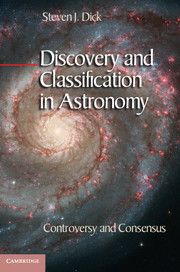Book contents
- Frontmatter
- Contents
- Preface
- Abbreviations
- Introduction The Natural History of the Heavens and the Natural History of Discovery
- Part I Entrée
- Part II Narratives of Discovery
- Part III Patterns of Discovery
- Part IV Drivers of Discovery
- Part V The Synthesis of Discovery
- Appendix 1 Astronomy’s Three Kingdoms
- Appendix 2 Astronomical Discoveries and Their Extended Structure
- Notes
- Select Bibliographical Essay
- Glossary of Concepts Related to Discovery
- Index
Preface
Published online by Cambridge University Press: 05 August 2013
- Frontmatter
- Contents
- Preface
- Abbreviations
- Introduction The Natural History of the Heavens and the Natural History of Discovery
- Part I Entrée
- Part II Narratives of Discovery
- Part III Patterns of Discovery
- Part IV Drivers of Discovery
- Part V The Synthesis of Discovery
- Appendix 1 Astronomy’s Three Kingdoms
- Appendix 2 Astronomical Discoveries and Their Extended Structure
- Notes
- Select Bibliographical Essay
- Glossary of Concepts Related to Discovery
- Index
Summary
The title of this volume will bring to mind for some readers Martin Harwit’s book Cosmic Discovery: The Search, Scope, and Heritage of Astronomy, published more than three decades ago. As an astronomer, Harwit’s practical aims in that book were twofold: first, to determine what fields of astronomy have the largest number of potential discoveries and, second, to explore what fields of astronomy might promise the most immediate advances and striking returns. By analyzing just enough history to answer these questions, Harwit hoped to provide answers of use both to students entering the field facing the daunting question of what part of astronomy to study and to policymakers who had only limited resources to dole out for the advancement of astronomy. In this effort at applied history he had only mixed success, but by taking the concept of discovery as a serious object of analysis, Harwit did what only very few astronomers, historians, or philosophers have done before or since. While it will become clear that I differ with Harwit on many issues, not least the crucial question of what constitutes a new “class” of object, I record here my debt to him, and others, for their boldness in attacking a concept so broad as “discovery.”
- Type
- Chapter
- Information
- Discovery and Classification in AstronomyControversy and Consensus, pp. xi - xivPublisher: Cambridge University PressPrint publication year: 2013



